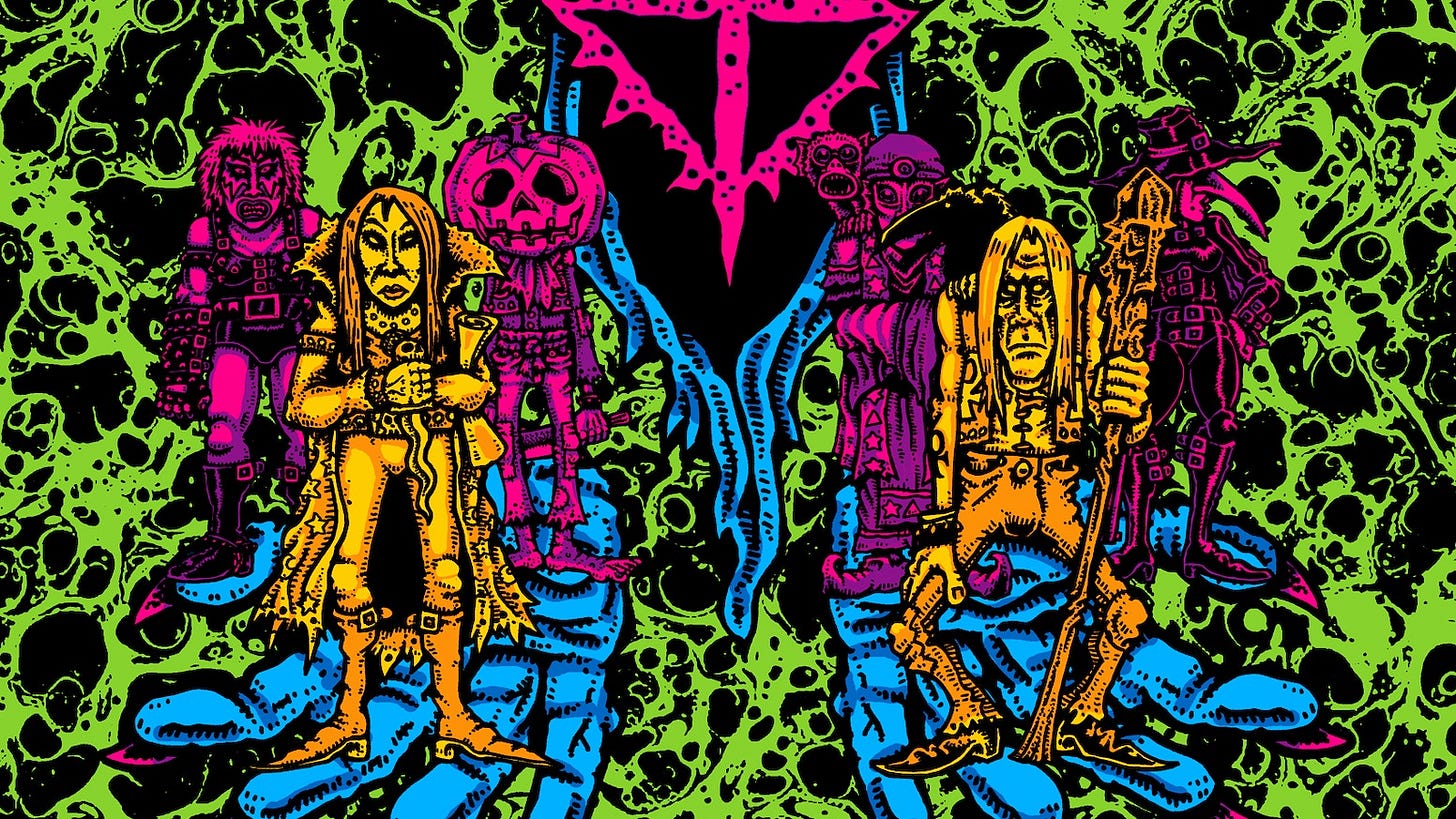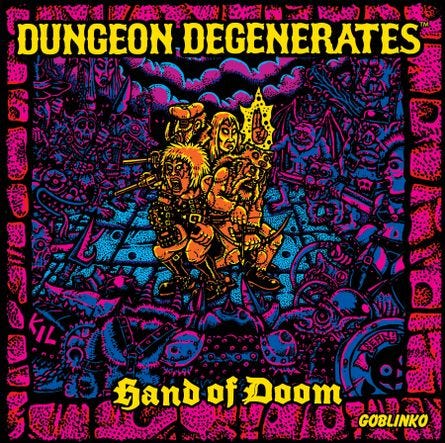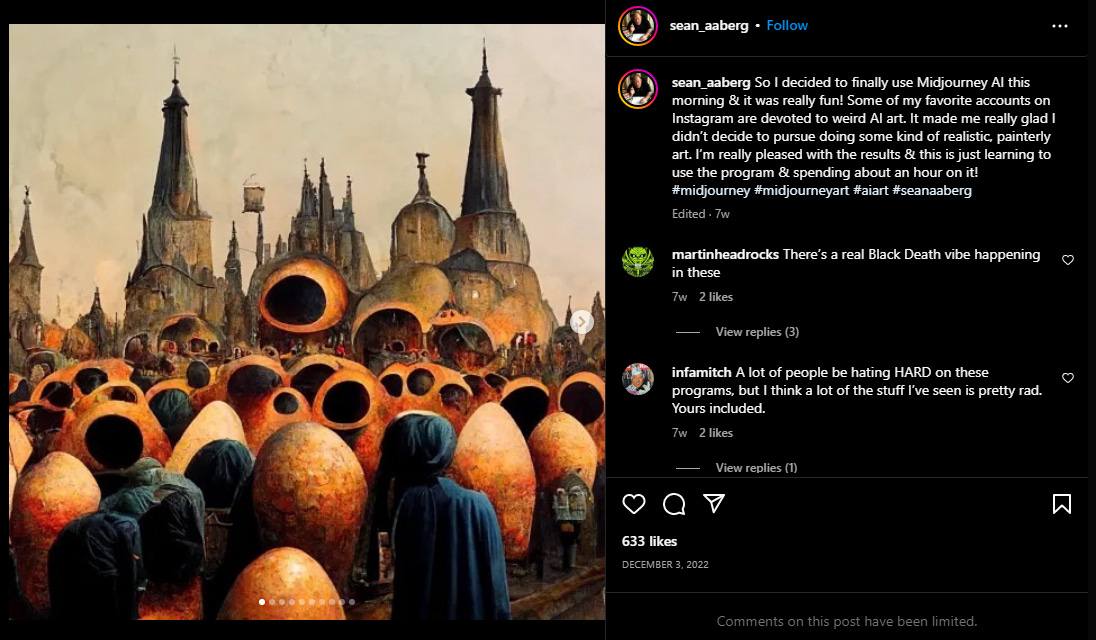Art-generating AI as an accessibility tool for disabled artists
(And let's nerd out on a rad-as-hell board game.)
Conversations about AI-generated art typically boil down to two topics: copyright law and the devaluation of art.
Artists argue that AI-generated art is the “exact opposite” of art and claim it has “the potential to devaluate the skill of illustration.”1 Other artists wage legal battles against AI-art companies like Midjourney, DeviantArt, and Stability AI, claiming legal and artistic violations.2 On the art corporation side, Getty Images is bringing suit against Stability AI, claiming copyright infringement.3
These topics dominate AI-art conversations largely because artists have repeatedly seen their artwork used as training data to enable AI programs to “reproduce” their style.4 And once the program has been trained on a particular artist’s style, it’s incredibly easy for users to recreate it with just a few textual prompts.
For example, Midjourney is an AI program that creates images from textual descriptions. To get started, you need to download Discord and create an account. Then, you head to Midjourney.com, click “Join the Beta,” and use the browser prompt to open Discord. You will see on the left-hand side of Discord that you have access to the Midjourney server.
To generate images, users join a public channel on the Midjourney server (e.g., newbies-41) and use the /imagine command to give the AI a text prompt. Based on that prompt, Midjourney creates four images, and users select one of them to upscale.
If a user wants the AI to create an image using a particular artist’s style, they need only include the artist’s name in the /imagine command. For example, the following image was created using the prompt: “Amazing Egyptian pharoan art for kids by Jon Klassen and Andreas Rocha -- ar 2:3” (emphasis added).
And voila — an image in the style of those artists, all within mere minutes, without any input from the artists whose style was imitated. Thus, artists and art corporations are justifiably concerned about what these tools can and will do to their industry.
However, while these topics are important, their dominance in the AI-art conversation means more nuanced and subtle topics are ignored. For instance, no one is talking about how art-generating AI systems can help an artist reclaim their artistry after a debilitating medical issue.
How artist Sean Aaberg uses Midjourney to create art after a stroke
In 2016, the board game Dungeon Degenerates: Hand of Doom debuted its fundraising campaign on Kickstarter and successfully raised $79,161. The initial run of 2,000 copies sold out and the game eventually earned itself an impressive review score of 8.2/10 on BoardGameGeek.com.
The game largely owes its success to illustrator Sean Aaberg, a self-described “street punk”5 who grew up creating counter-culture zines. As the artist behind the board game, Aaberg used vivid neon colors and subversive imagery to create a gaming experience that is equal parts cultural commentary and satisfying gameplay.
“We use corny fantasy tropes but modify them enough that they’re exciting again,” Aaberg told Tabletop Gaming. “You basically play, like — I want to use this dumb Dickensian term — which is ‘surplus population’. The [in-game] government of the Wurstreich is so corrupt that they’re just throwing people in the jails to rot. So, it’s kind of like America right now, where like people that have no place being in jail end up in jail and you’re basically trying to find your way in the world. Meanwhile, everything’s falling apart — wizards and monsters are trying to take over the land.”
And as the ratings show, board gamers love it. So Aaberg and his publishing company, Goblinko, expanded production and created numerous additional Dungeon Degenerates products. Everything seemed to be going great.
Then, in September 2018, Aaberg “suffered a major stroke affecting his cerebullum and brainstem,” leaving him in a critical condition “requiring life support.”6 Aaberg ultimately survived, but the stroke affected the left side of his body — his drawing side — and he can no longer “dive directly into sketching for ideas.”7
But after years of being unable to draw, Aaberg decided to use AI to generate his art. And on December 3, 2022, he posted to Instagram his first collection of art created using Midjourney.
The responses varied somewhat — with some making the usual copyright and devaluation of art comments — yet others were supportive, praising Aaberg for using Midjourney to return to his pursuit of art.
So, he kept creating via Midjourney, and over a few weeks he produced dozens of pieces, all with the familiar dark fantasy / weird imagery expected from him.
And true to his artistic interests, Aaberg experiments with AI art as a medium, using variations of Midjourney to see if one particular version of the AI provides images closer to his desired artistic result.
While this may seem like merely one artist’s story running against the typical conversation topics surrounding AI art, remember this: 61 million adults in the United States live with a disability.8 That's one in four.
So yes, Aaberg may seem like the rare case of one artist using AI art to reclaim their artistry, but it may be just as well that stories like Aaberg’s fail to find purchase in a conversation so often dominated by discussions about copyright law and the devaluation of art.
Aaberg’s story demonstrates that AI art can be infused with emotion, memory, longing, and the gamut of humanity that so many artists find lacking in AI art. It’s just that we need to start talking about how that happens.
https://www.theguardian.com/artanddesign/2023/jan/23/its-the-opposite-of-art-why-illustrators-are-furious-about-ai
https://arstechnica.com/information-technology/2023/01/artists-file-class-action-lawsuit-against-ai-image-generator-companies/
https://newsroom.gettyimages.com/en/getty-images/getty-images-statement
E.g., https://www.theverge.com/23444685/generative-ai-copyright-infringement-legal-fair-use-training-data
https://www.tabletopgaming.co.uk/features/interviewing-sean-aaberg-of-dungeon-degenerates-hand-of-doom/
https://www.gofundme.com/f/nnh4a-help-for-sean-aaberg-and-family
https://www.tabletopgaming.co.uk/features/interviewing-sean-aaberg-of-dungeon-degenerates-hand-of-doom/
https://www.cdc.gov/ncbddd/disabilityandhealth/infographic-disability-impacts-all.html












